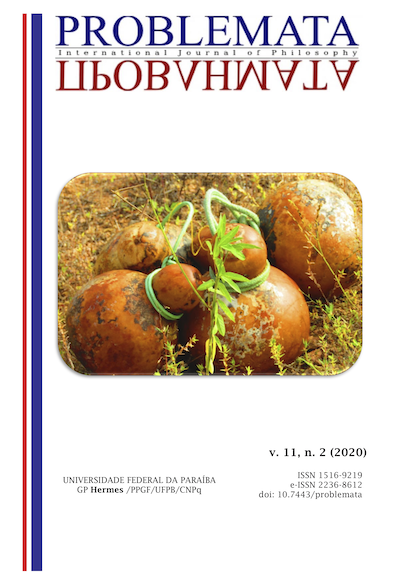AFRICAN COMMUNALISM:
ANARCHISM AS A WAY OF LIFE
DOI:
https://doi.org/10.7443/problemata.v11i2.53967Keywords:
African political philosophy, African communalism, AnarchismAbstract
His article, having as its main theoretical subsidy the work African Anarchism: the history of a movement, by Sam Mbah and I.E. Igariwey (2018), aims to present the existence of "anarchist elements" in the organizational structure of some traditional African societies, making it possible for the authors to affirm that anarchism, too, can be understood as a way of life. To this end, I will present general aspects of anarchist theory in order to later go into the main features that allow the authors to defend the existence of communal organizations on the African continent and to demonstrate that communalism/societies without a state was not an anarchist utopia.
Downloads
Download data is not yet available.
References
ERVIN, Lorenzo Kom’Boa. Anarquismo e Revolução Negra e outros textos de anarquismo negro. São Paulo: Sunguilar, 2015.
MBAH, Sam. Anarquismo africano: a história de um movimento. Rio de Janeiro: Rizoma, 2018. 145 p.
MBAH, Sam. Anarquismo africano: a história de um movimento. Rio de Janeiro: Rizoma, 2018. 145 p.
Downloads
Published
2020-07-22
Issue
Section
Papers
License
Authors who publish with this journal agree to the following terms:
- Authors retain copyright and grant the journal right of first publication with the work simultaneously licensed under a Creative Commons Attribution License that allows others to share the work with an acknowledgement of the work's authorship and initial publication in this journal.
- Authors are able to enter into separate, additional contractual arrangements for the non-exclusive distribution of the journal's published version of the work (e.g., post it to an institutional repository or publish it in a book), with an acknowledgement of its initial publication in this journal.
-
- Authors are permitted and encouraged to post their work online (e.g., in institutional repositories or on their website) prior to and during the submission process, as it can lead to productive exchanges, as well as earlier and greater citation of published work (See The Effect of Open Access).





